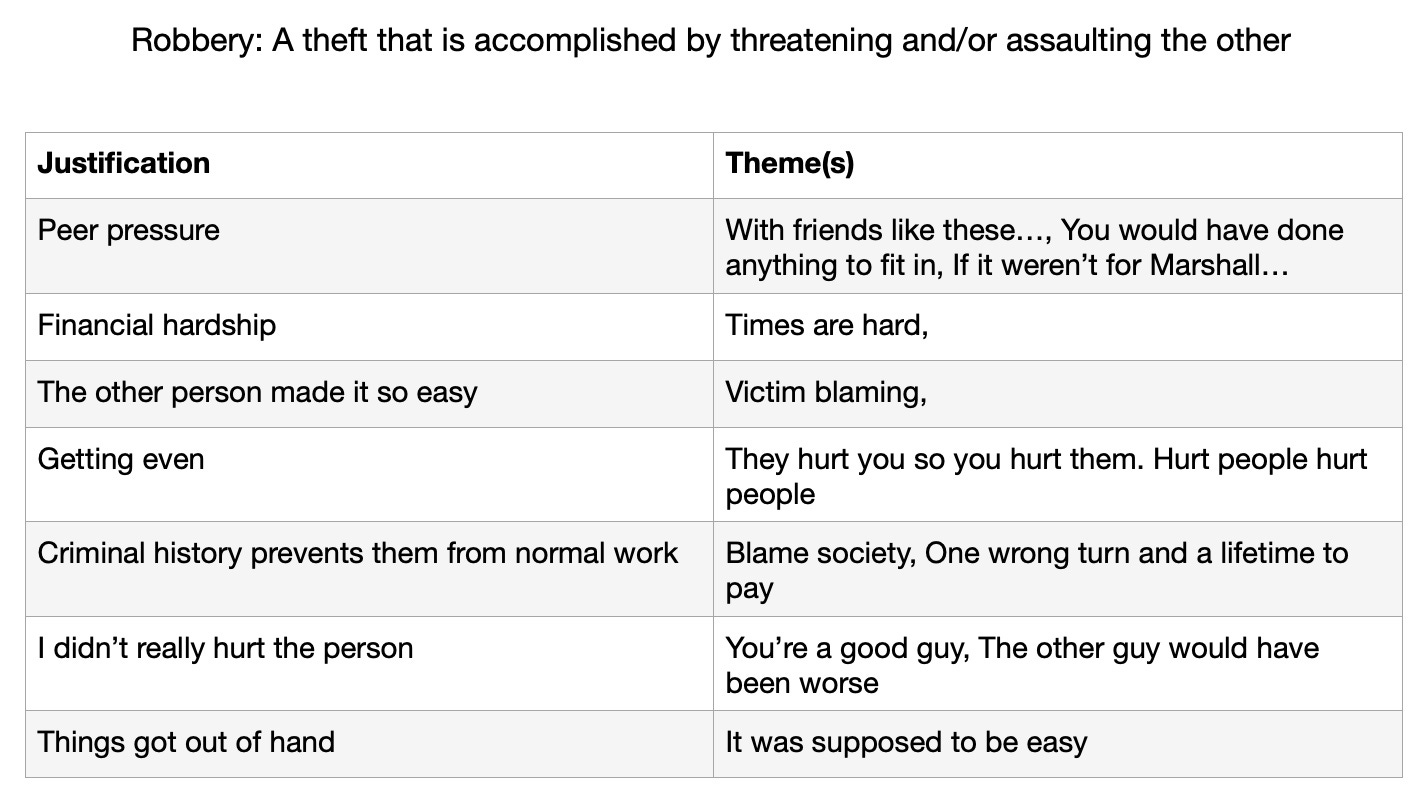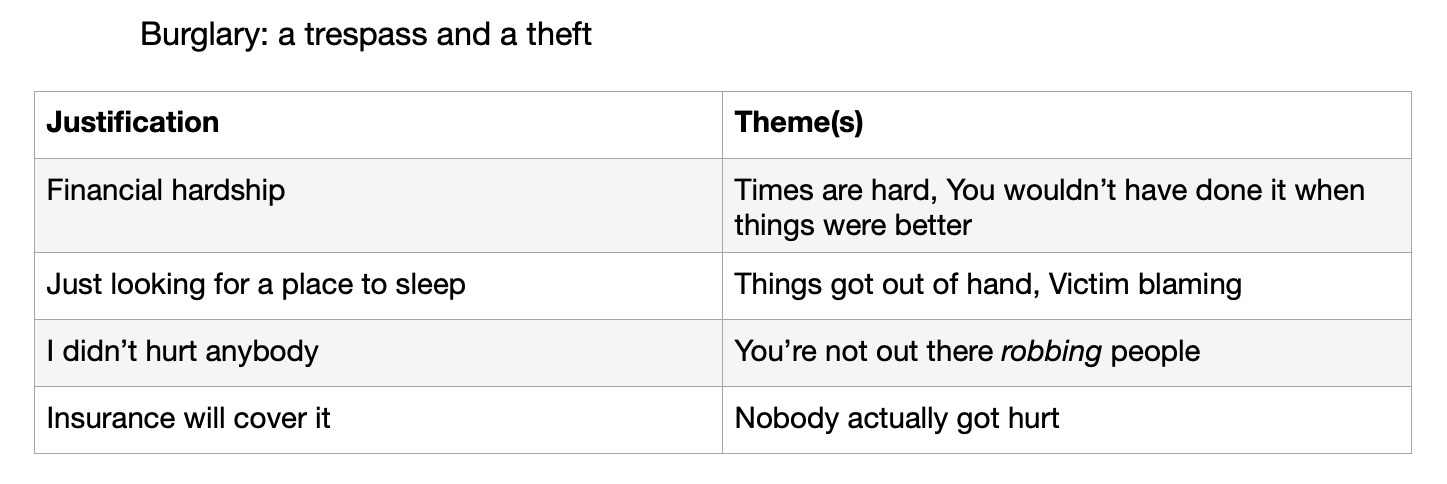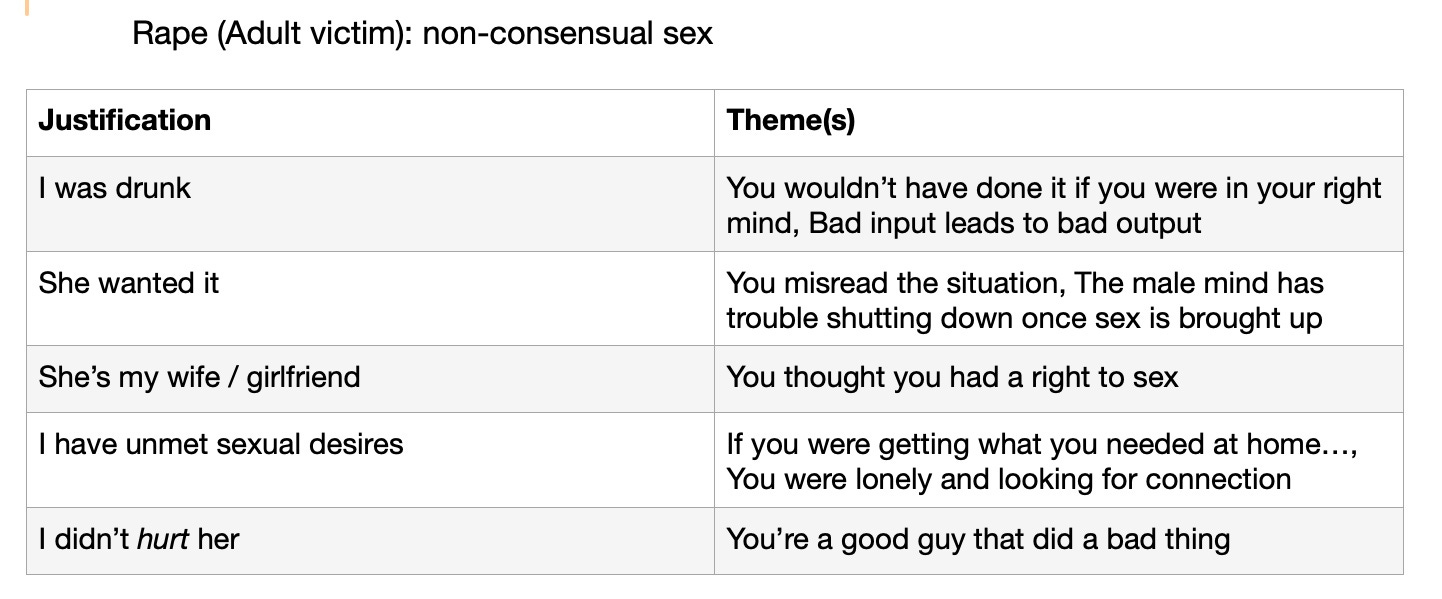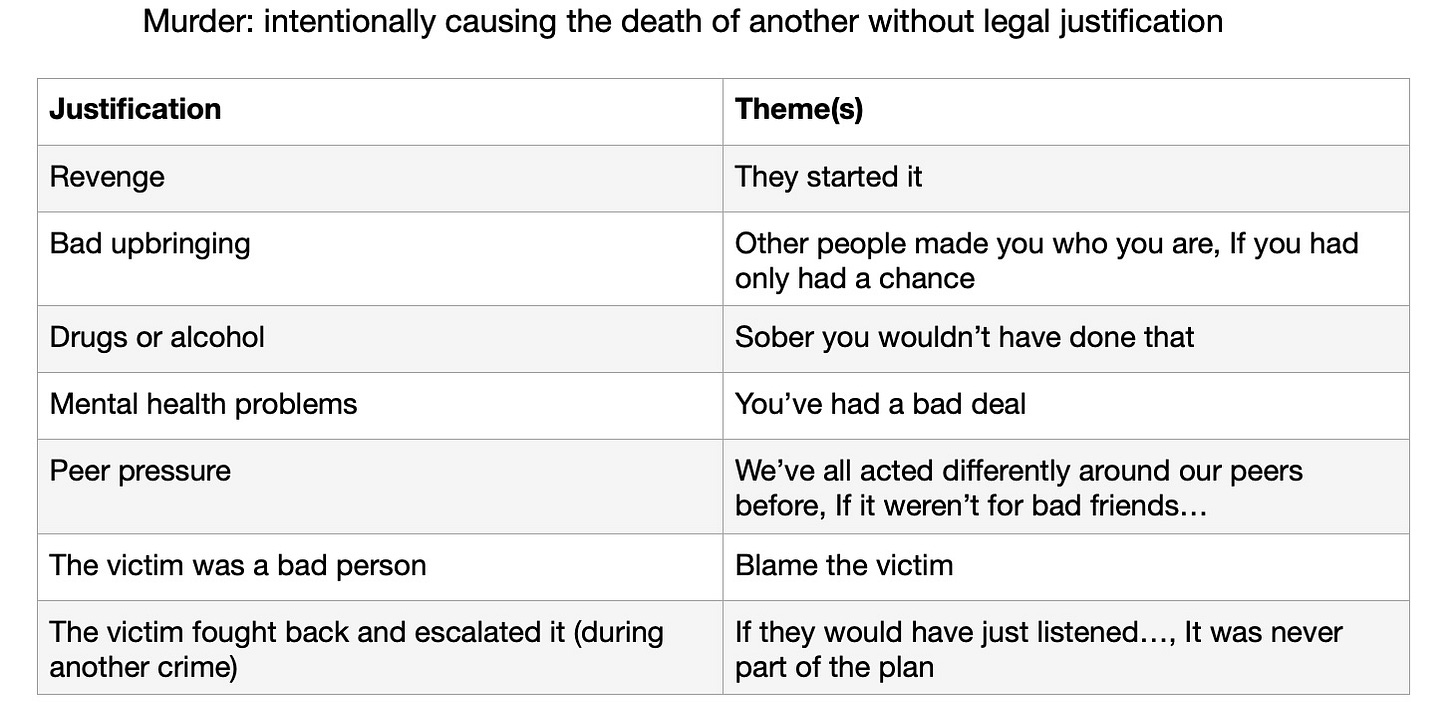Interrogation Themes
Hello to all of my new readers! My partner and I have been teaching at the annual Crimes Against Children Conference, and it has been wonderful to meet you all. Many of you have expressed interest in having us out to train at your agency. If you would like to find out about availability and pricing, please check out our website, and send us an email. We are open to travel. Moderninterviewingsolutions.com.
What follows is an excerpt about theme selection from my upcoming book on interview and interrogation. This is one of the most misunderstood aspects of interrogation. In this article, I’ll explain how I approach it, and I’ll provide lots of examples.
Themes
“How must they [sex offenders] see the world so that their behavior seems rational and acceptable to them?” - Graham Hill
When I teach, many questions I answer have to do with themes in interrogations. What are they? How do they work?
Essentially, a theme is an idea that is woven throughout the interrogation. This idea is used to minimize the importance of the crime. It provides an explanation for how the crime may have happened. Selecting the perfect theme is hard. But selecting a good enough theme is relatively easy. The theme does not have to explain how the actual crime happened but rather a way that it might have happened that morally excuses the suspect without legally excusing them.
For example, there is the YouTube video of the interrogation of James Rauch, a former professor caught for soliciting sex from a minor. At one point in the interview, he said, “My own motivation is not to…to…to…um…just find somebody who’s interested in me. Ok. Not young. Not old. Not fat. Not thin. Not…Someone who is interested in…in…who I am.” You are lucky when you find somebody who spells it out for you like this. His theme is, Everybody Deserves Love.
Of course, Rauch is actually soliciting sex from underaged girls because he is sexually attracted to them. Maybe it’s power and control issues. Maybe it’s one of any number of unmet psychological needs. As working cops, it’s not for us to understand what this man’s sexual desires are. Rather, we have credible information he is soliciting sex from minors, and we need to test that information against his denials.
Using a theme like Everybody Deserves Love allows somebody like Rauch to save face because it offers him a moral excuse. I would be wrong to say anything that suggested excusing him criminally. For example, if I said, “Maybe you thought you were talking to an age-appropriate person. That would be ok. Wouldn’t it?” That would be offering him a defense to prosecution. It’s not soliciting sex from a minor if you thought the person was of legal age.
Having a person admit to a non-crime isn’t exactly the truth you’d hope for from a guilty person. If we theorize to Rauch he did the crime because he was lonely and he agrees, his loneliness is not a defense to prosecution. That is a way of morally excusing him. If we theorize to Rauch he got confused and thought the person was of age, that is a defense to prosecution, which would criminally excuse him.
There are times when investigators might make a calculated decision to offer a suspect a theme that criminally excuses them in the hopes they can then use an admission to tie the person to the crime. I see this a lot in homicide cases. The investigator offers the suspect a self-defense claim, “Maybe you shot him because he was threatening you.” If the suspect agrees to it, they are now committed to being the shooter, but they have a defense to prosecution that will have to be overcome.
If your case facts are strong enough, you may be able to overcome a defense to prosecution with evidence. In a case like this, having the suspect admit to committing the actions that caused the resulting criminal allegations may be worth the risk to the case. For example, I offered a self-defense claim to a suspect in a murder case once. In that case, I had good evidence that the gunshot didn’t happen the way she said it did. I also had evidence she had taken steps to cover up her actions afterwards. I made the choice to offer that theme as a calculated risk.
If your case facts aren’t strong enough, you’ll have to progress the interrogation to the point the person then admits it wasn’t actually self-defense or whatever other defense to prosecution they are claiming. My experience is that it is terribly difficult to get a person to move off of claims which criminally excuse them.
I recall one interrogation of a child abuse suspect where the detective got them to admit to doing the actions that caused the injury. In order to do it, they offered the theme that maybe it was all a horrible accident. When the detective came out, they were happy to have gotten the “confession.” I asked them, “What are you going to charge them with, though?” In the interview room, the detective hadn’t thought about how an accident didn’t meet the culpable mental state required to charge a person with injury to a child.
If this detective believes the suspect purposefully committed the crime, they would need to build on the admission to move them past “accident.” Now the actions are stipulated to, but the culpable mental state is not. The interrogation would center around the culpable mental state rather than the actions themselves. “You said it was an accident, but we both know it wasn’t. You may have lost control, but you knew what you were doing.”
If you decide to offer them a criminal excuse as a tactic, do it knowingly as part of an overall strategy. Don’t offer themes that criminally excuse the suspect unless you have a plan. That plan will be to lock them into an admission of committing the actions and then addressing the culpable mental state either through evidence or an interrogation to uncover the mentality.
Selecting Themes
So how should you select your theme? Think through the crime, and ask yourself, “If they did it, how are they likely to have justified the crime?” Good themes arise from likely justifications. If your theme is based on a likely justification, it will seem infinitely more acceptable to the suspect than having done it because they are bad people. It doesn’t really matter if the person justified the crime in a different way.
You’ll find the theme follows on from the justification. Once you have selected a theme, the shape of your interrogation is formed. You’ll use the theme to talk, provide examples, and give arguments for why you know they did the crime and why they should tell you about it. It helps to pull from life and work experience to fill out the things you will say. If you are at all worried about what to say in an interrogation, start with naming your theme.
Let’s go through some examples for each of the major crime types. I provide a possible justification that a suspect having committed the crime might use. I then name a possible theme to address that justification. You’ll see that the themes are not long or complex even though what you have to say about those words will be long.
This isn’t an exhaustive list of justifications or themes. It doesn’t have to be. Think about how the person may have justified the crime, and your theme flows from there. Choose a theme, and begin to work it. Let’s keep going through some other crimes. Afterwards, we will look at how you might develop these themes in the interrogation.
Note: avoid any references to them having permission to take the items or permission to be in that location. Those would provide a possible legal defense to prosecution.
Note: With adult rape crimes, it is never appropriate to use the theme of Blame the Victim. In these types of crimes, you would have to suggest the victim wanted sex with the suspect. If the victim wanted sex, then it is consensual sex and therefore not illegal. Blame the Victim can be very effective in child sex crimes where the victim is statutorily incapable of consent. While Blame the Victim is highly effective in child sex crime interrogations, I’d note victims are not to blame no matter what theme you may use to get their assailant to talk.
Note: Again, no victim is to blame for their abuse. The use of this theme to get the truth is not an endorsement of any of the suspect’s actions.
In whatever type of case you have in front of you, think about how the suspect may have justified the crime. Usually you won’t know the suspect, so you’ll have to do some thinking about their situation. It doesn’t matter why you might have done the crime. Why did this three-time felon commit another robbery? Maybe he felt like he didn’t have any other choice. Why did this school teacher touch his student? Maybe he thought the victim wanted it. Why did this stepfather rape his stepdaughter? Maybe he thought his sexual needs were unmet. The theme selection follows on from the justification.
The theme you select will be based on everything you know about the suspect. Ideally, you will have knowledge about them going into the interview. Then you will learn more about them during the interview. If you listen, most interviewees will tell you what’s important to them. By the end of the interview, you will know a lot about the suspect. Now you take everything you know, and you think about how they may have justified the crime. Then you select your theme.
You don’t need an official theme. It doesn’t have to come from a list somewhere. Your goal here is to propose a theory for why the crime happened in a way that morally excuses the person without criminally excusing them. The theme you select is a way of addressing a likely justification for the crime.
I’ll provide an example from each crime type listed above as to how the theme might be developed. A theme is not just a few words you say once and forget about. You can’t just say, “I think you did it because of curiosity and opportunity. Tell me why you did it.” You have to work on it. A lot of interrogation is talking with periodic accusations. A theme helps you stay on track when you run out of things to say.
Robbery theme: Times are hard.
I’ve been thinking about this case a lot, and it occurred to me crimes like this don’t happen when times are good. You don’t read stories about a guy making a living wage with a good home life out there sticking people up. No sir. They don’t do it because their lives are easy. The same hasn’t been true for you. You’ve been living hard for a long time. You talked about a few jobs you’ve had along the way, but none of them have worked out. That shows you’re trying! If you had just had a little more luck. If the inflation hadn’t eaten up all that you earned. If those things were going well, you wouldn’t have beat that man up for his money.
I’ve worked cases where moms told me they were working three jobs to make ends meet. Even by working themselves to death they are barely making it. How’s a guy like you with a felony conviction supposed to even get one job much less three? How’s that supposed to happen. No, you beat that man up because you were frustrated. Everything’s gone to hell, and you acted in a way you wouldn’t have in a better world, a better economy. Once he was down, you saw his wallet, and you probably thought, “Here’s a stroke of luck. Here’s a chance to get ahead.” You stole his wallet, and that’s how we ended up here.
Burglary theme: Nobody actually got hurt
You know, “burglary” sounds harsh. You went into that man’s house, and you took a few electronics. Ok, you didn’t have his permission for that. Ok, he’s a little inconvenienced. Who actually got hurt, though? Living in that fancy neighborhood you know he has insurance. He gets all new stuff. You get enough to eat and feed your drug habit. It almost sounds like everybody wins.
I remember when I was in high school, the school was broken into. The news reported it was this big thing. A burglary! I found out the next day they went in through an open door, and they took a few computers. What the news didn’t report on, though, is that the computers were old, and they were going to be replaced anyway. I thought at the time, “How is this such a big deal if nobody even got hurt?” It’s not right what you did. I’m not making you any promises about what’s going to happen. If it’s true, though, that you did what you did because you didn’t think anybody would get hurt, then I think we need to talk about that. Let’s tell your story and explain how this happened.
Rape (Adult victim) theme: You wouldn’t have done it if you had been in your right mind
Something that really gets me on your case is how exactly a person like you could have done a thing like this. I lost sleep over it during the investigation. I finally realized it was probably because you were drunk. Sober Robert wouldn’t do a thing like that. Sober Robert goes to work, plays with his kids, and turns his taxes in on time. Sober Robert is the kind of citizen we all want more of. He’s the kind of friend we want to have.
Drunk Robert is different though. Drunk Robert does things that he shouldn’t. When I was in college, I was friends with a guy named Duncan. Duncan was the nicest, friendliest person you could ever ask to meet. Drunk Duncan was a menace, though. Something twisted in his brain when he drank. He’d get in fights, collapse in his own vomit, and break anything in sight. The difference was night and day, and there was no doubt at all that it was the alcohol.
In your case, Robert, the drinking might not create such an extreme result, but it affects you nonetheless. Here you were on a date with a new girlfriend. You were probably feeling nervous, and you took to drinking. With all of the nerves, you drank way past your limit. When you two left the restaurant, it was Drunk Robert that took her up to her room.
Note: In Texas, the use of drugs and alcohol are not a defense to prosecution. Make sure this is the case where you work too or else you’d be criminally excusing them.
Murder theme: Peer pressure
Your actions led to his death. That much is true and we know it. Our investigation proves it. What our investigation doesn’t show, though, is why you did it. Why would a guy out on the town with friends shoot a man to death? That’s a question people are going to want to know, and I recommend that you tell them. Let me tell you what I think it was. I’ve been all over every aspect of this case. It dawned on me the other day you were probably pushed to do something you didn’t want to because of peer pressure.
That man shoulder checked you, and your friends let you know only a wimp would let something like that pass. You may be a lot of things, but a wimp isn’t one of them. You pulled out, and you let him have it. It never would have happened if those friends hadn’t been there. You had a split second to choose what kind of guy you were. In that moment, you couldn’t let yourself lose face.
We’ve all done stuff we wouldn’t normally do with peer pressure. I remember being a kid. I had just gotten my license. Of course the first thing I did was pick up my friends. I got them all in the car, and we went out riding. We cruised the town until one of them started teasing me for driving like a grandma. Then they all took it up. Without thinking more about it, I gunned the car, and I raced through a series of red lights. That’s when the police lights got behind me.
The thing is, every person that hears your story is going to understand what it means to experience peer pressure. They may not be able to understand killing another person over it, but they will all know what it feels like to be pressured by their friends. Most will know what it means to act in a way that isn’t normal when they are around their friends. What you did isn’t right, but if we can at least make it understandable, it humanizes you. It’s harder for somebody to think you’re a monster when they see the forces moving you are the same forces they’ve experienced before.
Sexual Assault of a Child theme: Curiosity and opportunity
You aren’t the first person I’ve talked to about being involved in a situation like this. I’ve talked to dozens of other men that have been in your exact situation. What I’ve learned from those other men, is they aren’t evil people. They are usually people who have thoughts they shouldn’t have at the same time that they are presented with an opportunity they don’t usually have. That’s curiosity and opportunity.
We all have thoughts that we shouldn’t. A teacher of mine once told me “normal” people have sexual fantasies regularly. Of those “normal” people with sexual fantasies, the fantasies themselves are 90% normal, mainstream sexual fantasies. Stuff you might see on any mainstream porn site. What surprised me, though, was he said that even “normal” people have about 10% of their sexual fantasies that get weird, kinky, or deviant. This teacher said the reverse was true of people that suffer from deviant sexual thinking. Those people have 90% kink and 10% mainstream.
The point is even “normal” people have kinky thoughts that make them curious about stuff they probably shouldn’t be doing. Fantasy is a type of curiosity. Usually it passes through your head, and there’s nothing to be done about it, so it goes away.
On the other hand, any adult will have had sexual opportunities in their life that they didn’t follow up on. Maybe they were in a committed relationship at the time. Or maybe they just weren’t into the person. An opportunity without curiosity or willingness to follow up on it is nothing.
Now, where things go wrong, is when curiosity meets opportunity. That kinky thought comes to you at the exact time you have the chance to act on it. My experience talking to people who have been through what you’re going through is that THOSE situations are where bad things happen. I think that’s what happened in your case.
Once you get your theme going, you’ll work it into the pattern of an interrogation.
Thanks for reading. Please share, comment, and stay in touch. If we can work with you to provide training, we’d be glad to hear from you.
Until next time!





